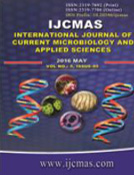


 National Academy of Agricultural Sciences (NAAS)
National Academy of Agricultural Sciences (NAAS)

|
PRINT ISSN : 2319-7692
Online ISSN : 2319-7706 Issues : 12 per year Publisher : Excellent Publishers Email : editorijcmas@gmail.com / submit@ijcmas.com Editor-in-chief: Dr.M.Prakash Index Copernicus ICV 2018: 95.39 NAAS RATING 2020: 5.38 |
The pathogenesis of peptic ulcer is multifactorial and arises from an imbalance between protective and aggressive factors. This work aimed to assess the possible protective role of serum zinc in patients with peptic ulcer disease and declare any correlation between serum zinc level and H. pylori infection. Fifty consecutive patients with symptoms suggestive of peptic ulcer disease were included. All underwent complete clinical evaluation, laboratory investigations, upper gastrointestinal endoscopy and rapid urease test. Measurement of serum zinc level was done for all the included patients in addition to twenty five age and sex matched healthy control subjects. The mean serum zinc level of the studied patients was highly significantly decreased in comparison to healthy controls (P= 0.002). Moreover, a significant stepwise decrease in serum zinc level was observed with increased severity of gastric (P<0.01) and duodenal mucosal injury (P>0.05). At serum zinc cut-off level of 87 µmol/L, patients had gastric and duodenal endoscopic lesions with sensitivity, specificity, positive predictive value and negative predictive value of 58%, 92%, 93.5% and 52.3%; respectively. On the other hand, no significant difference was detected in serum zinc levels between H. pylori positive and negative patients (P>0.05). Zinc may play a protective role against gastric and duodenal mucosal membrane injury. Serum zinc cut-off level of 87 µmol/L could predict positive gastric and duodenal endoscopic findings.
 |
 |
 |
 |
 |